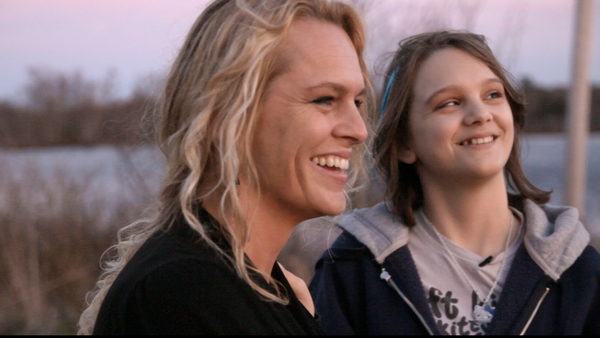Six years in the making, this documentary follows Michelle Smith through her graduation from the Perkins School for the Blind in Watertown, Massachusetts, and her subsequent struggle to make social connections and live independently in a world where she falls outside the defined boundaries of normal. Director Garrett Zevgetis’s self-described mission in making this film was to tell Michelle’s story without focusing on her disabilities.
Along with being legally blind, Michelle was diagnosed in childhood as having Asperger’s syndrome. After graduation, she lives with her mother in Bangor, Maine, which for her is a navigable retreat with opportunities for positive social interaction, while her father and brothers still live in the isolated country home she grew up in. Michelle’s childhood memories are a painful mixture of being teased at public school, the early death of her youngest brother, her parents’ contentious relationship, and the difficulty of maneuvering in a natural environment.
However, Michelle is anything but socially awkward. Most of the time, she’s bright, outgoing, vivacious, and determined not to be held her back. However, she is also prone to becoming overwrought and argumentative and retreating into herself when she feels her disabilities are dominating her life.
Aware of the degree to which she is dependent on her mother, and derisive toward herself regarding a failed job opportunity, Michelle’s desire to rise above her circumstances propels her to find ways to experience life on her own. She skates at a roller rink, goes to bars, becomes involved in a sexual role-playing community, and spends a week in Los Angeles. Her confidence and self-esteem develop, allowing her to overcome the reservations expressed by family and a former teacher.
Cinematographers Jordan Salvatoriello and Sarah Ginsburg occasionally evoke Michelle’s limited vision through blurred images and shadowy scenes. A particularly effective sequence conveys Michelle’s discomfort at a basketball game, her enhanced hearing amplifying the nails-on-chalkboard squeaking of sneakers on the court and the explosive yells from the crowd.
Though Zevgetis emphasizes Michelle’s personality and accomplishments, her disabilities are an integral a part of her story. Although she’s very relatable and a delight to observe, in the end that is all viewers are doing. Zevgetis provides snippets of her life, including intriguing asides about the tension in her family and her interest in BDSM, and that is all we walk away with. The film’s strongest aspect, though, chronicles how someone like Michelle, even with her obvious talents and abilities, can be made to feel like an outcast and pushed into a life of dependence by conventional thinking that focuses on what she can’t do rather than on her abilities.

















Leave A Comment